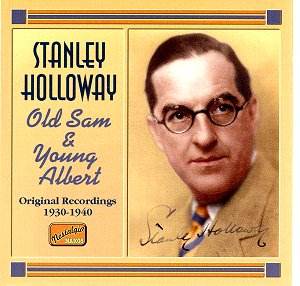It just wouldn’t be Christmas in the U.K.
if, over the holiday break which now extends
to the New Year, ‘The Sound of Music’ or ‘Mary
Poppins’ didn’t feature on the terrestrial
TV schedule, usually on Christmas Day itself.
In 2003 there was a minor shake up and we
got George Cukor’s 1964 film version of Lerner
and Loewe’s musical ‘My Fair Lady’. The leads
were taken by Rex Harrison as Proff. Higgins
(the part James Cagney took on Broadway),
with the eponymous lady herself being the
delectable Audrey Hepburn, admirably showing
off Cecil Beaton’s couture, but with her singing
dubbed to the voice of Marnie Nixon. The part
of her father was acted and sung by Stanley
Hollway and included the memorable song ‘Get
me to the Church on time’. The film got 7
‘Oscars’ and Holloway found himself re-discovered
in the U.K., where he had been largely known
for his work on the variety stage, particularly
for his monologues, many of the most famous
and memorable of which are found on this disc.
Born in 1890 Holloway could well be described
as a polymath entertainer. He appeared alongside
Sir Laurence Olivier in ‘Hamlet’ (1948) before
creating dustman Doolittle on Broadway at
the age of 65 and where his daughter was Julie
Andrews, who did sing her own words! In his
early twenties Holloway had fancied himself
as a budding operatic baritone and went to
Milan, at his own expense to study. However,
World War 1 saw him conscripted into the army
and he returned to the stage to co-write and
star in the ‘Co-optimists’, a revue that ran
for six years at the end of which he returned
to the variety theatre performing rhyming
monologues including ‘Sam. Pick Oop Tha’ Musket’,
which he wrote himself (tr.2). Hearing him
one night, George Marriot Edgar, a writer
and fellow performer in the ‘Co-optimists’,
provided Holloway with the script of ‘The
Lion and Albert’ (tr.1), which became one
of his most popular monologues.
Holloway’s style was to present the monologues,
with piano accompaniment, in a Lancashire
dialect, one not so broad as to be incomprehensible
in Cheshire and points south, but inflected
and intonated with his innately musical baritone
and enunciated with perfect diction. As the
monologue evolves the characters come vividly
to life as one listens, particularly as they
convey so much of the social mores of the
time. The wife is always mother (trs.1. 4.
12) the army officer is very public school
whist soldier Albert is a down to earth working
class with perhaps a touch of revolutionary
Marxism in his non-conformist soul (tr.2 and
13). Even Noah speaks better than another
Sam as he tries to negotiate the price of
Maple, to furnish ‘The Ark’, down from ‘three’apence
a foot’ (one and a half pre-decimalisation
pennies) Trs. 3. 9. The humour of the situations
was not so much in the remote possibility
of the happenings being true, but the identification
of the audience with the situation and the
reaction of the characters that they had come
to know so well. Not all the follow up monologues
are of the quality of what might be called
the first in the series. This is particularly
true, I felt, in respect of Noah and Sam Oglethwaite,
whilst Albert in particular, but also Sam
Small, the soldier, fare better.
The recordings include here date from ‘Old
Sam’ of 27th October 1930 to ‘Yorkshire
Pudding’ (tr.10) and ‘Brown Boots (or as Holloway
says it’ Brahn Boots’) tr.14, set down on
29th October 1940.The later recordings
have more presence than the earlier, all are
clear and an excellent representation of the
Holloway my minds ear carries from performances
I heard from him in the theatre and on the
radio over fifty odd years ago. This collection
of Holloway, and his famous monologues, is
but one facet of the artistry and creative
imagination of one of the 20th
centuries greatest entertainers. However,
it should provide happy recollection to many
oldies and enjoyment to a younger generation
who perhaps pass the credit list of ‘My Fair
Lady’ without realizing the name and the important
part Holloway played in keeping British spirits
alive and kicking in the dark days of World
War 2 and the years preceding and following.
Highly recommended.
Robert J Farr
 CD Reviews
CD Reviews CD Reviews
CD Reviews